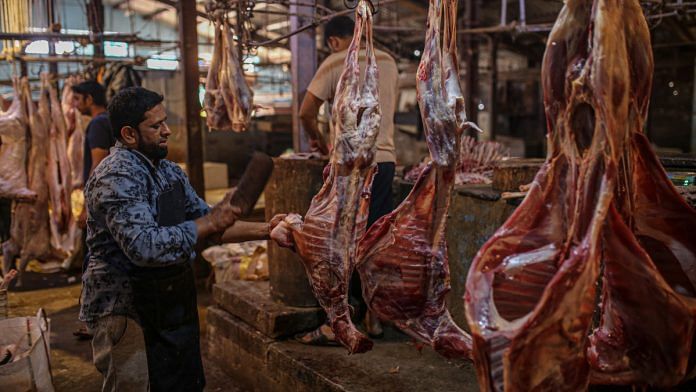New Delhi: Right-wing groups in Karnataka had recently given a call for boycott of halal meat products during Varshadodaku or Hosa Todaku — the day after Ugadi — when many communities in the state have a non-vegetarian feast.
BJP National General Secretary C.T. Ravi had also called halal meat products an “economic jihad”. He said when Muslims refuse to buy non-halal meat from Hindus, “why should you insist that Hindus must buy from them?”
However, the call for boycott seems to have had no major impact on meat sales in Karnataka. In Bengaluru, a halal meat seller was quoted by PTI as saying that there has been no impact on his business.
“All our customers are buying…there is no difference. None of our customers mentioned anything about the issue (halal boycott). They are in a hurry, today being a special day, and they are purchasing (meat) how much they want…so there is no issue… I’m happy,” he said.
However, some traders who sell only halal meat, claimed that their business was slightly impacted with people choosing the jhatka cut because of the campaign. A second seller quoted by PTI said the door-to-door campaign by some fringe Hindu groups against halal meat during the festival has affected business.
ThePrint explains the difference between halal and jhatka meat.
‘Halal’ vs ‘jhatka’
Halal is an Arabic word meaning lawful or permitted. When used in reference to food, it is the dietary standard as prescribed in the Quran. The opposite of halal is haram, which stands for anything that is prohibited or unlawful.
The dual concepts of halal and haram are universal terms that apply to all facets of life. These terms are commonly used in relation to food products, meat products, pharmaceuticals, personal care products etc.
Usually, halal foods are those that are free from any component that Muslims are prohibited from consuming and processed or produced in accordance with the Islamic law (Shariah).
Islam places great emphasis on the way in which an animal’s life is ended. If the life of an animal had to be ended for the survival of humans, then it may be done so in the name of god.
The method of Islamic slaughter, commonly known as ‘halal’ cut, is claimed to have been designed in a way that reduces the pain and distress an animal suffers. The animal is killed by slitting the throat with one continuous motion of a sharp knife. The cut must sever at least three of the trachea, oesophagus and the two blood vessels on either side of the throat. However, the spinal cord must not be cut.
Once cut, the animal must be allowed to bleed out and be dead completely before processing further.
Some experts say that this process results in the least amount of suffering, as when a cut is made swiftly and cleanly the animal loses consciousness before the brain can perceive any pain. The animal becomes unconscious within seconds and death occurs due to cerebral hypoxia.
Contrary to halal, jhatka or ‘chatka’ cut is the meat from an animal killed instantaneously. The word jhatka is believed to have been derived from the Sanskrit word ‘jhatiti’, meaning ‘instantly, quickly, at once’.
This type of slaughter is preferred mostly by Sikhs as well as meat-consuming Buddhists and some khatiks, an ethnic tribe found mostly in the Punjab region.
‘Jhatka karna’ refers to the instantaneous severing of the head of an animal with a single stroke of any weapon, with the underlying intention of killing it with minimal suffering. In this method of butchering, an animal must not be scared or shaken before the slaughter and killed by the single strike of a sword or an axe to sever the head.
Importance in Sikhism
While not all Sikhs maintain the practice of eating jhatka meat, it has been mandated by the 10 Sikh gurus. According to the Sikh tradition, only meat that is obtained from an animal which is killed with one stroke of the weapon and causing its instant death is fit for human consumption. Guru Gobind Singh had also enjoined upon Sikhs to abstain from halal meat introduced by the Muslim ruling class.
With inputs from PTI
Also read: ‘Hindus have become aware’: How Hindutva groups are boycotting Muslims at Karnataka temple fairs



